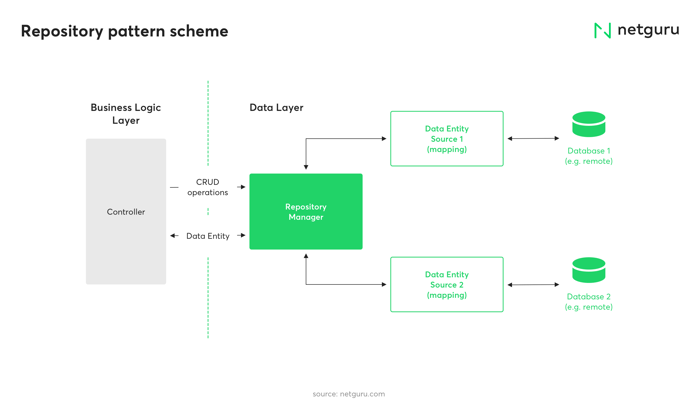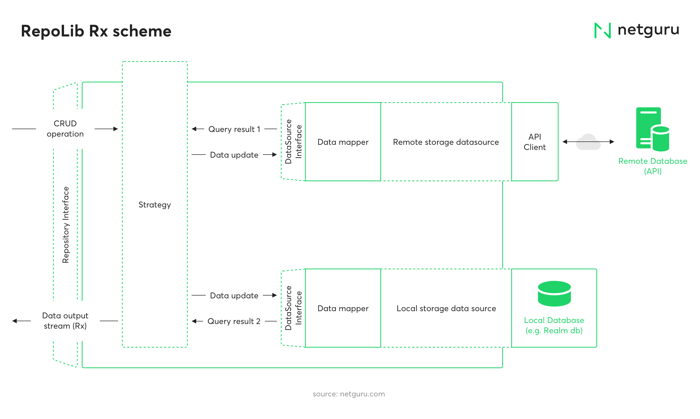How to Speed Up Native Mobile App Development? Simple Trick

However, this step is often ignored, especially in mobile app development, where choosing the right architecture can be tricky - for various reasons. But a lack of good architecture may lead to some serious issues during the development process... So you really have to implement one, and you have to do it right — both in order to avoid potential problems that may arise and to speed up the entire development process.
Because you don’t want to unnecessarily waste your precious time and money, do you...?
Architecture implementation: speed it up!
When an application has an architecture implemented, it is much easier for devs to build and maintain the code, allowing them to solve many problems quickly and out-of-the-box. It’s because architecture structures the code, which includes things like business logic, data management rules, and views mechanics. But implementing an architecture itself takes time, which results in additional initial costs. Of course, this is something that pays off in the long term with more readable code, smoother development, simpler functionality testing, etc. So... if something can be done in a more effective way, why wouldn’t you try it?
If you’re wondering how to speed up mobile app development and reduce the amount of time necessary to implement good architecture, I have some good news for you: there are plenty of ready-to-use solutions, like libraries or frameworks, which you can implement right away, without having to build your architecture from scratch. This is very common, for example, in JavaScript projects, as well as with Android applications.
Ready-made solutions are proven to be effective and not only do they improve the overall development of your app by introducing a certain structure, but they also make the entire process less cumbersome by bringing on some cut-and-dried components. They carry advantages that are truly invaluable:
- Firstly, you don’t have to write a lot of code for the architecture because... it’s just pointless to invest in something that already exists. This gives you some serious savings, the kind that allow you to use your assets on other important tasks.
- Secondly, all ready-made solutions have already been tested and are constantly being improved, so you can avoid any bugs that often show up somewhere along the way when you build something on your own.
- Thirdly, you can take advantage of the code reuse approach. So, instead of proceeding with copy/paste programming and having duplicated code, you just have a function that executes the code whenever needed without rewriting all the lines.
- And last but not least, it’s time-saving and consequently — a really cost-efficient option, as you don’t have to reinvent the wheel. You can implement your architecture fast and relatively flawlessly.
Sounds good, doesn’t it? You can accelerate the development process significantly and still have a solid foundation on which you can build your app.
But, unfortunately… not all areas of mobile development are covered by ready-made libraries. This is the case, for example, with data layers in Android applications. They are responsible for storing and retrieving data, and these processes involve a lot of repetitive operations in terms of data synchronization. Without proper architecture app development would certainly take much longer than necessary and the code itself would be more prone to errors.
However, at Netguru we developed a ready-to-use solution for this too: an open-source library for mobile apps that simplifies the problem and saves you a lot of time.
How to speed up native mobile app development with RepoLib Rx?
RepoLib Rx is an open-source, Kotlin-based library developed specifically for Android applications. It provides you with a ready-made structure — a data layer architecture — along with a mechanism for handling data synchronization between two data sources, like a backend API and a local database on the device.
In order to achieve higher flexibility and easier service (e.g., multi-threaded operation), the library is written on the basis of the Reactive Programming paradigm. It is also based on the Repository pattern, which is used as the foundation of architecture for the data layer structures.

So, what are the main benefits of using the RepoLib Rx library?
- First and foremost, the library has been designed to reduce the time needed to implement the data layer in Android applications by providing a unified architecture with predefined mechanisms of data handling. You get it without having to write classes that are responsible for handling queries, managing storage, or writing the synchronization logic controller that handles passing data between sources.
- Secondly, making use of the RepoLib Rx library reduces the implementation of the whole data layer to that of a few classes responsible for translating the model based on the needs of a specific API. Your job is simplified to the breaking point in order to help you proceed with your native mobile application development faster and in a less complicated manner.
- Thirdly, in addition to the ready-made and unified structure, the library also includes predefined synchronization strategies. They determine how and when the application is to download data from the local database onto the device and when and how to update the local database with new API data.

Thanks to this approach, your application gets a uniform structure that has been tested and is proven to work outstandingly well. As a result, your native app development becomes much simpler and quicker, with a much higher payoff than if you were to build the entire architecture from scratch, since you would be investing significantly less money into this stage of the project. It is also less frustrating because you avoid a lot of synchronization-related problems that can really lead to many sleepless nights for developers...
Easier mobile development
As you can see, shortening the native mobile app development process is possible from the very beginning. There are plenty of open-source libraries and components you can use to simplify the process, saving both time and energy and, above all, help keep your money in your wallet. So, even though it is believed that cross-platform development is much quicker than native mobile development, there are some tricks and solutions that native mobile developers can easily implement to make the process of development pretty snappy as well.
RepoLib Rx is one example of how to reduce the time needed for app development in the most optimal way. This solution allows you to avoid frequent errors that can be painful and enthusiasm-diminishing (e.g. by providing automation: if there is an error in a library, you can correct it once to have it corrected in every other place - you don't have to go through all of them manually). All you need to do is take it, implement it, enjoy it, and keep up the good work. Because what’s the point in building something from scratch when someone has already done a huge part of the work for you?
This, and many other tricks, are exactly what will allow you to save time and prepare an efficient and easy to maintain application, making your work as pleasant as possible. And remember - you are not alone in your software project. If you need more information, our team of experts can advise you what is the best solution for your business. Drop us a line and let us know if there’s anything we can help you with.








